Quality improvement training for healthcare professionals
60 Pages20241 Words178 Views
Added on 2020-10-05
Quality improvement training for healthcare professionals
Added on 2020-10-05
ShareRelated Documents
Module Name: Dissertation1

ABSTRACT The lack of proper training to the hospital staff can affect the safety and health outcomesof the patient. It is very essential that for the quality improvement training needs must beincorporated into practice. The study is qualitative with an exploratory research design. Primaryand secondary data is used and sample population is chosen by simple random sampling.Themes were included in the data analysis and conclusions. The key findings were that use oftraining provisions for the health care professionals helps them to make proper assessment ofpatients and their needs. Thus, it enhances the quality of services provided to patients and betteroutcomes are achieved. This research on improving quality of patient care through training isbased upon inductive approach and it has been found from the analysis that it is very essential forthe health care service providers to build a training framework for the health care staff forimprovement of patient quality. 2
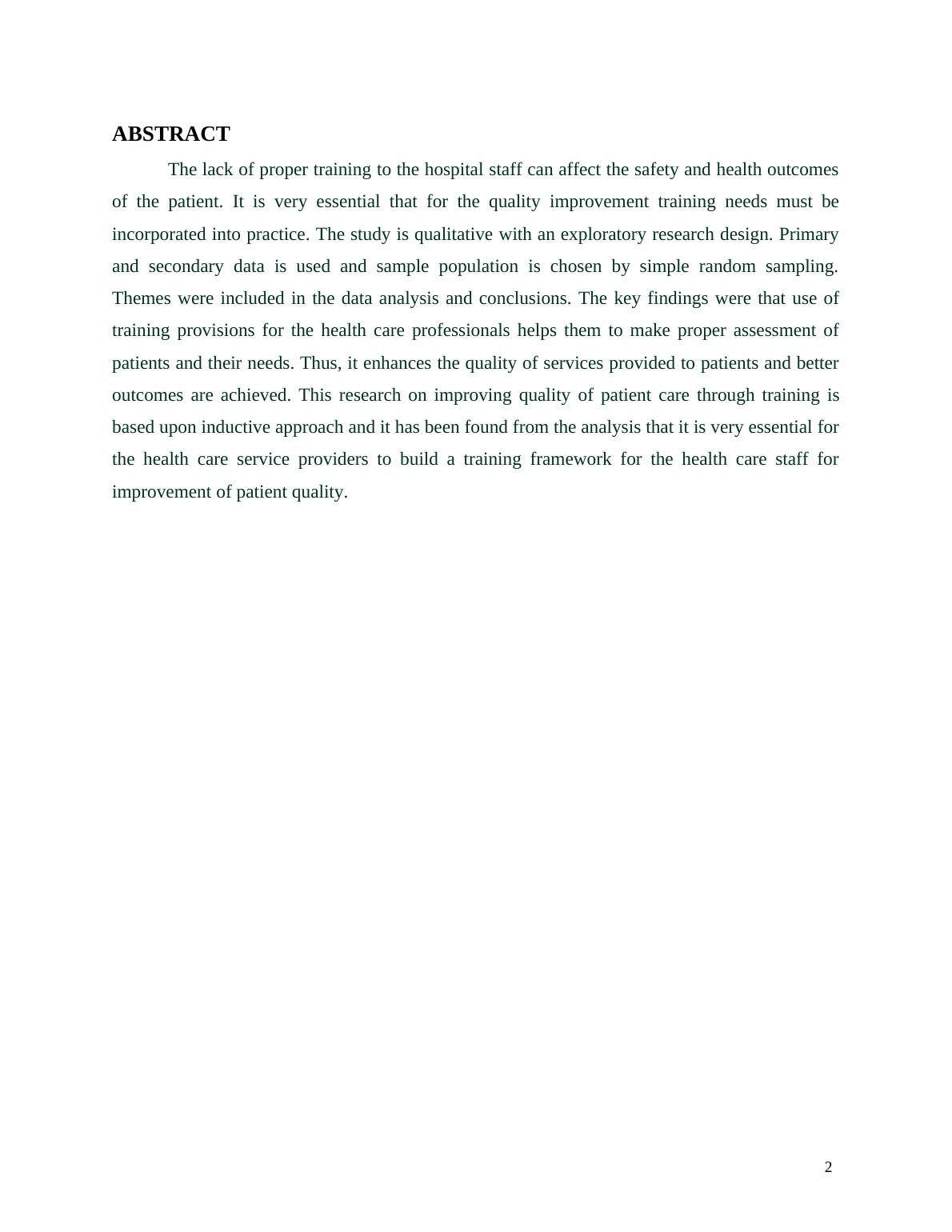
Table of ContentsTopic “To evaluate the effect of regular staff training on quality of patient services”. Research onNMC Hospital Group.......................................................................................................................5Chapter 1. INTRODUCTION..........................................................................................................51.1 Overview of Research......................................................................................................51.2 Overview of Organization................................................................................................61.3 Rationale of Research.......................................................................................................61.4 Significance of the Study..................................................................................................71.5 Scope................................................................................................................................81.6 Research Aims and Objectives.........................................................................................81.7 Research Question............................................................................................................9Chapter 2. LITERATURE REVIEW.............................................................................................102.1 Concept of staff training sessions...................................................................................102.2 Areas under NMC Hospital Group where improvement is necessary...........................122.3 Ways by which quality of services can be improved.....................................................152.4 Role of staff training in improvement of quality services..............................................17Chapter 3. METHODOLOGY.......................................................................................................203.1 Research Type................................................................................................................203.2 Research Design.............................................................................................................213.3 Research approach..........................................................................................................223.4 Research Philosophy......................................................................................................233.5 Sampling.........................................................................................................................25Chapter 4. DATA ALAYSIS.........................................................................................................274.1 Statistical Analysis.........................................................................................................274.2 Thematic Analysis..........................................................................................................284.3 Data Collection...............................................................................................................28 Chapter 5. ETHICAL CONSIDERATIONS................................................................................305.1 Informed Consent...........................................................................................................305.2 Minimum Risk of Harm.................................................................................................305.3 Confidentiality and Anonymity......................................................................................303
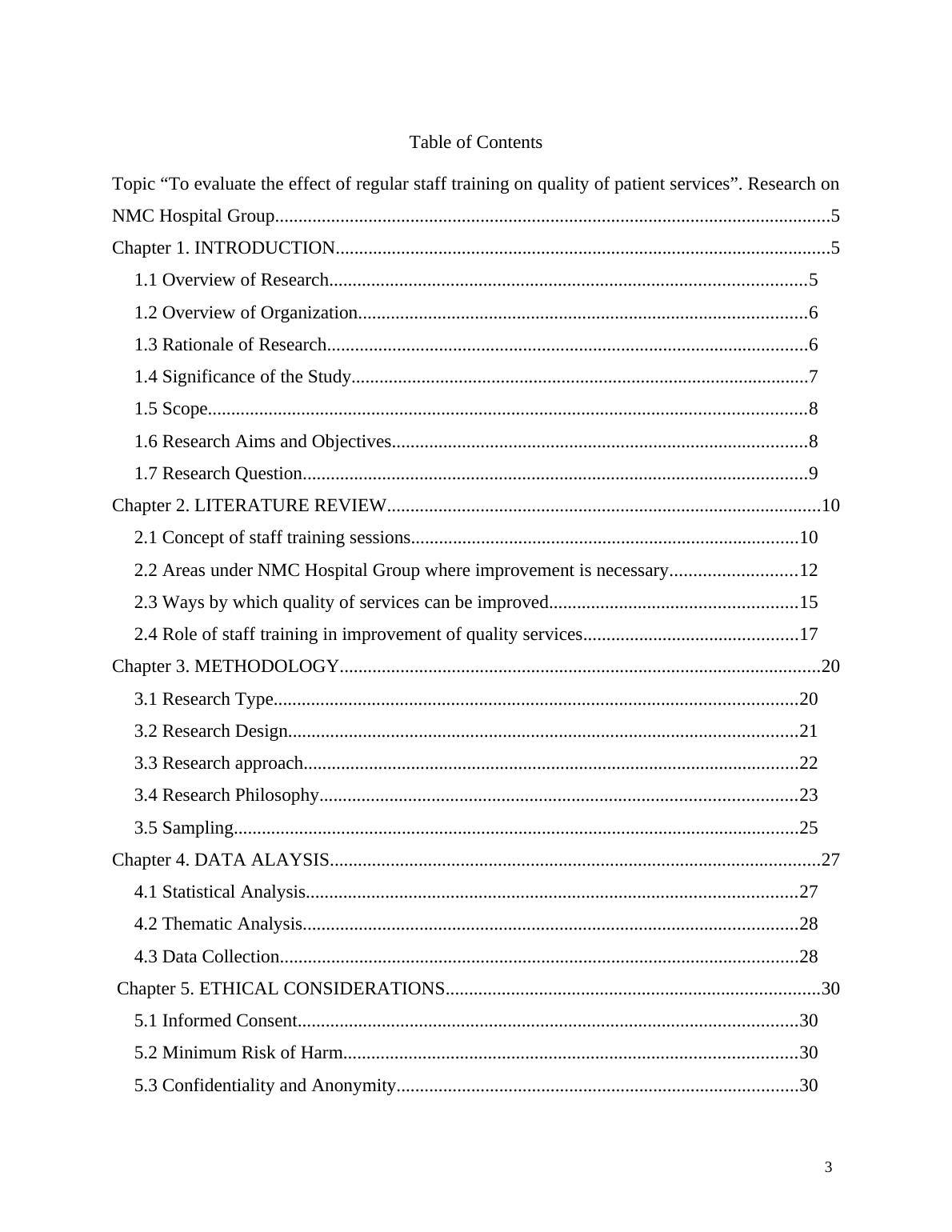
5.4 Right to Withdraw..........................................................................................................305.4 Deceptive Practices........................................................................................................31 Chapter 6. RESULTS....................................................................................................................326.1 Thematic Analysis..........................................................................................................356.2 Foreseen Limitations......................................................................................................506.3 Research Schedule..........................................................................................................52Chapter 7. CONCULSION AND RECOMMENDATIONS.........................................................54AREAS FOR FUTURE RESEARCH...........................................................................................56REFERENCES..............................................................................................................................574
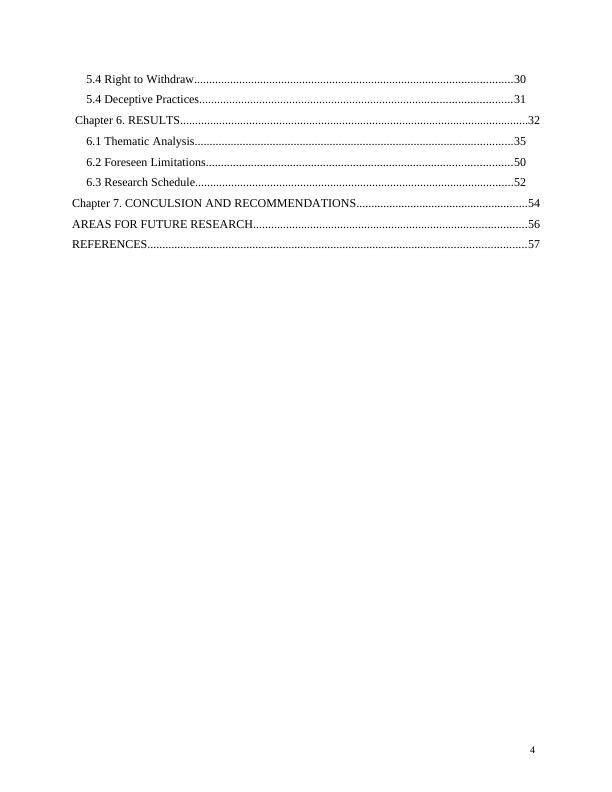
Topic “To evaluate the effect of regular staff training on quality of patient services”.Research on NMC Hospital GroupChapter 1: INTRODUCTION1.1 Overview of ResearchTeam-based care can be defined as a provision of health services to families, individualsand communities. Here, at least two health providers work in collaboration to provide high-quality care. Patients receive high quality of services and feel safer, when providers work ineffective manner as a team. Therefore, for delivering better services, it is essential for everyservice industry to make investment for optimising healthcare teamwork. In addition to this, forimproving more patient-centred primary care and promising to provide best services,organization dealing under hospitality industry, must concern on making improvement in otherfields also (Alam and et. al., 2014). It includes bringing high-technologies to diagnose diseasesof patients and equipment to maintain their medical records accurately. Moreover, riskassessment is required to be done before preparation of care-planning to provide appropriatemedication, for well-being of patients. Quality improvement in health care services is one of the most challenging and essentialaspects for the healthcare professionals. Quality improvement in patient services is not onlyessential from the clinical and health perspective but also from the financial perspective (Graban,2016). The training programs which are aimed at enhancing the skills and efficiency of serviceproviders in healthcare are important for assuring the quality services. Technology has beenadvancing rapidly so that person cantered care can be enhanced. In order to keep the pace withthe regular advancements in medical and healthcare it is vital for the healthcare professionals tobe well aware with the continuous changes. Along with this aspect nursing and staff members who does not have experience to workin stressful and practical situation of healthcare organization are also required training. Thetraining helps novice health experts to understand and learn the real-world challenges andsituations of their profession. In healthcare services, wide range of tools such as clinical audits,evidence and reflection based learnings, quality frameworks and performance managementstrategies are used to provide holistic care to patients. However, the lack of experience andknowledge creates difficulties in meeting the quality benchmarks of health services. 5
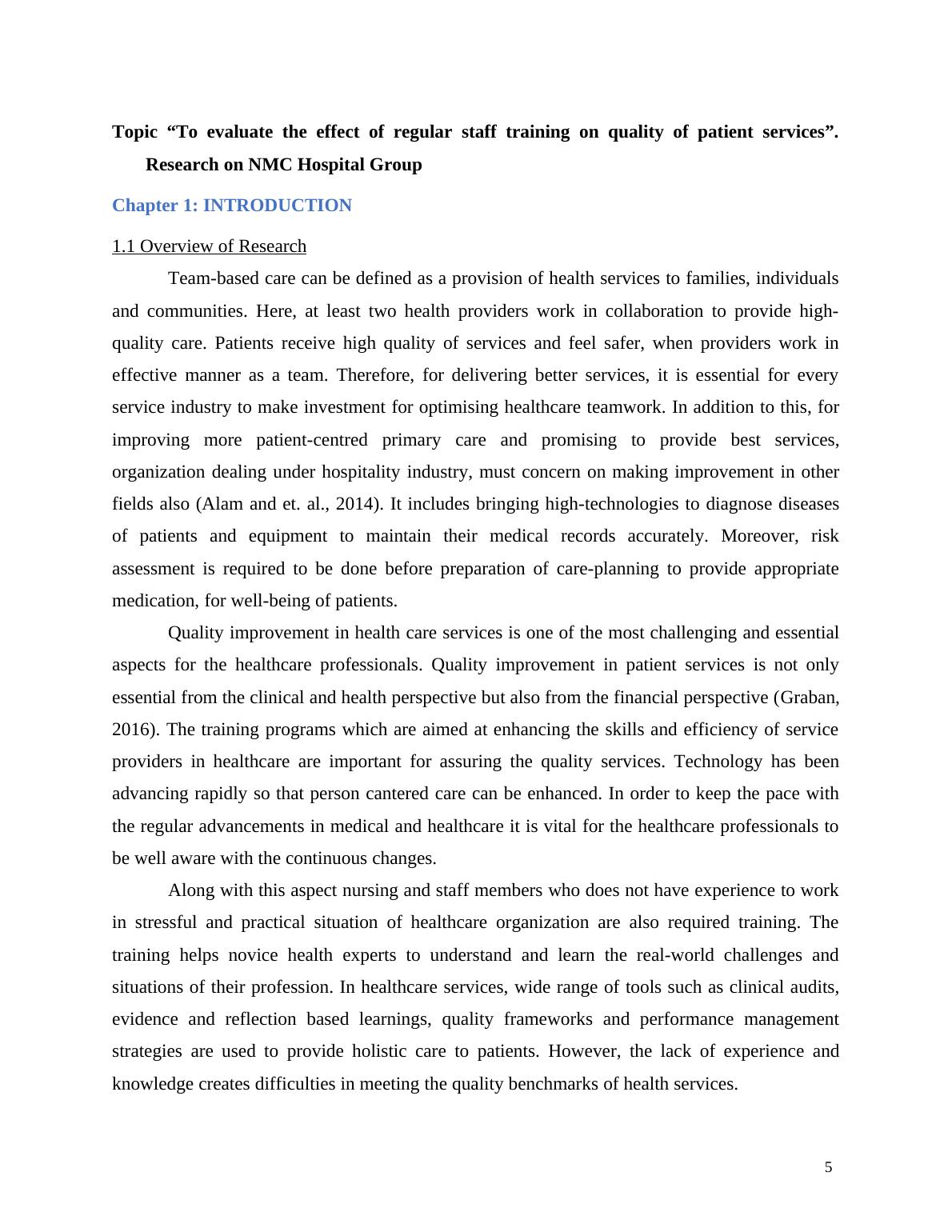
Team work, coordination, and leadership are also considered as essential formal qualitiesfor the professional excellence (Waldron and et.al., 2016). The professionals may not learn thesequalities during their training or learning period. For meeting the needs of patients, health serviceorganizations regularly conduct training sessions for their staff members. These training sessionsidentify the need of quality improvements. Training sessions have positive impact on thebehaviour, knowledge and attitude of professionals. Many health organizations assume that merefinancial incentives are capable to improve the performance and quality of health services. It has been observed that the training mechanisms holds the equal importance because itenhances the skills of service providers. Though health professionals are well aware about thebasic knowledge and skills needed for their professional commitment through books andfellowships (McCormack and et.al., 2017). However, these methods do not enable serviceproviders to upgrade the skills and methods as per the needs of patient and advanced medicalequipment’s and technology. It is essential that regular training sessions must be integrated withthe quality improvement schemes of health services. 1.2 Overview of OrganizationNMC Healthcare is one of the largest private healthcare in UAE, which ranks as the bestleading fertility service providers in whole world. For last 43 years, NMC proves its commitmentto provide the best effective services for well of its patients. It has gained trust of more thanmillions of patients by providing them personalized care and genuine concern. But from the lastfew years, this hospital face issues related to provide satisfied services to its patients (Campbelland et. al., 2014). The reason behind this is due to ineffective performance of staff members. Tofill service gap in healthcare delivery system as well as offer a continuum of care to patients,research has been conducted to identify strategies. It identifies where improvement in serviceindustry is needed and ways through which the same can be achieved. This organization wasawarded as leading hospital firm, with continuous development into the contributing its effortsfor the people saving initiatives as well as development of the humanity. Its major focus onservice effectiveness rather than profit generation.1.3 Rationale of ResearchThis research proposal is strongly related to leadership in healthcare sector. It will mainlyhighlight role of regular staff training in quality services of patients (Combes and et. al., 2014).The research also describes how regular based training sessions of hospital staff can improve6
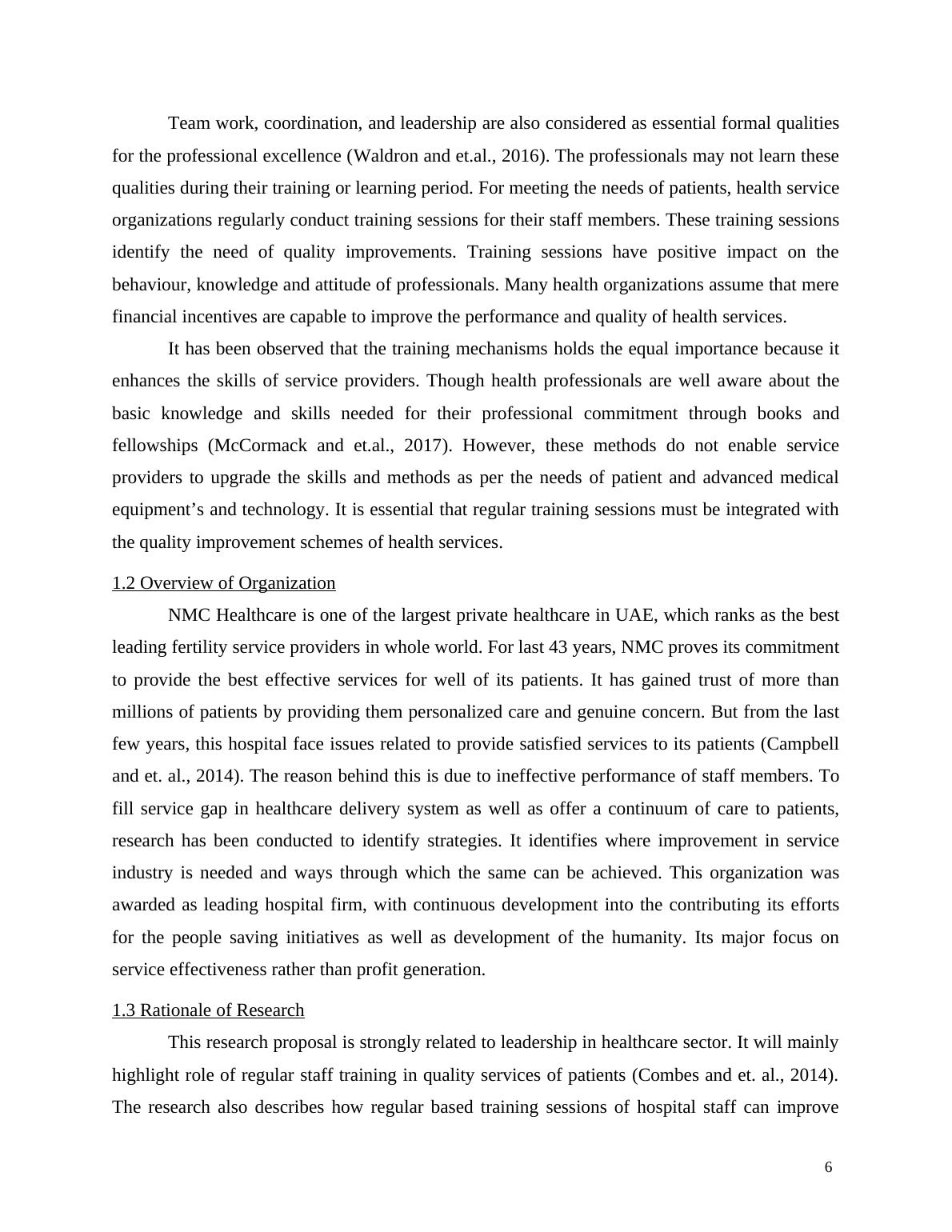
productivity and working capability. It also elaborates that if a hospital conducts regular basedtraining sessions for its staff then it will directly improve patient services. This clearly claimsthat an effective leadership is required by all industry, it simply improves functioning as well asquality services of every sector (Carayon and et. al., 2014). Health care services can be improved only when they take perspective of their users intoaccount. For instance, for providing complete care to patients, multidisciplinary teams arenecessary. However, the health professionals from various disciplines cannot work together as ateam until they understand its need and approaches. For improving the service quality and patientcare, staff members must be trained and guided so that they can work in collaboration (Merrill,2015). This research is essential so that hospitals and health professionals can understand theneed and concepts of training sessions. There are various organizations who are well aware withthe importance of training but fails to identify the actual areas which need improvement. Thereport may help health organizations to analyse the need of quality improvement practices. It can also guide health professionals on how they can enhance their skills andcapabilities. The training sessions will help these professionals to improve the services and toexplore advanced knowledge and methods in their professional practice. The research can helphospitals to understand that how training sessions can help to enhance their efficiency inproviding quality services. It has been observed that support workers in healthcare provides bothclerical and clinical care to patients. However, there staff members are not provided any kind ofprofessional training. It influences their skills, efficiencies, and patient care efforts of serviceproviders (Gleeson and et.al., 2016). The several barriers such as training budgets, lack of assessment of training needs, andinefficient organizational structure affects the training methods and plans in hospitals. Thisreport evaluates how different clinical areas need staff training for improving the quality. Alongwith the quality services training sessions also assures that operational efficiencies are achieved. 1.4 Significance of the StudyThe operational errors are highly unacceptable in healthcare profession as it directlyaffects the survival of an individual. Training sessions are also important to assure that clinicalerrors or the lack of expertise does not become life threatening for the patients (McCormack andet.al., 2017). The study is an effective way to analyse the impact and the need of trainingsessions on performance of staff members. It can also explain the several areas in healthcare in7
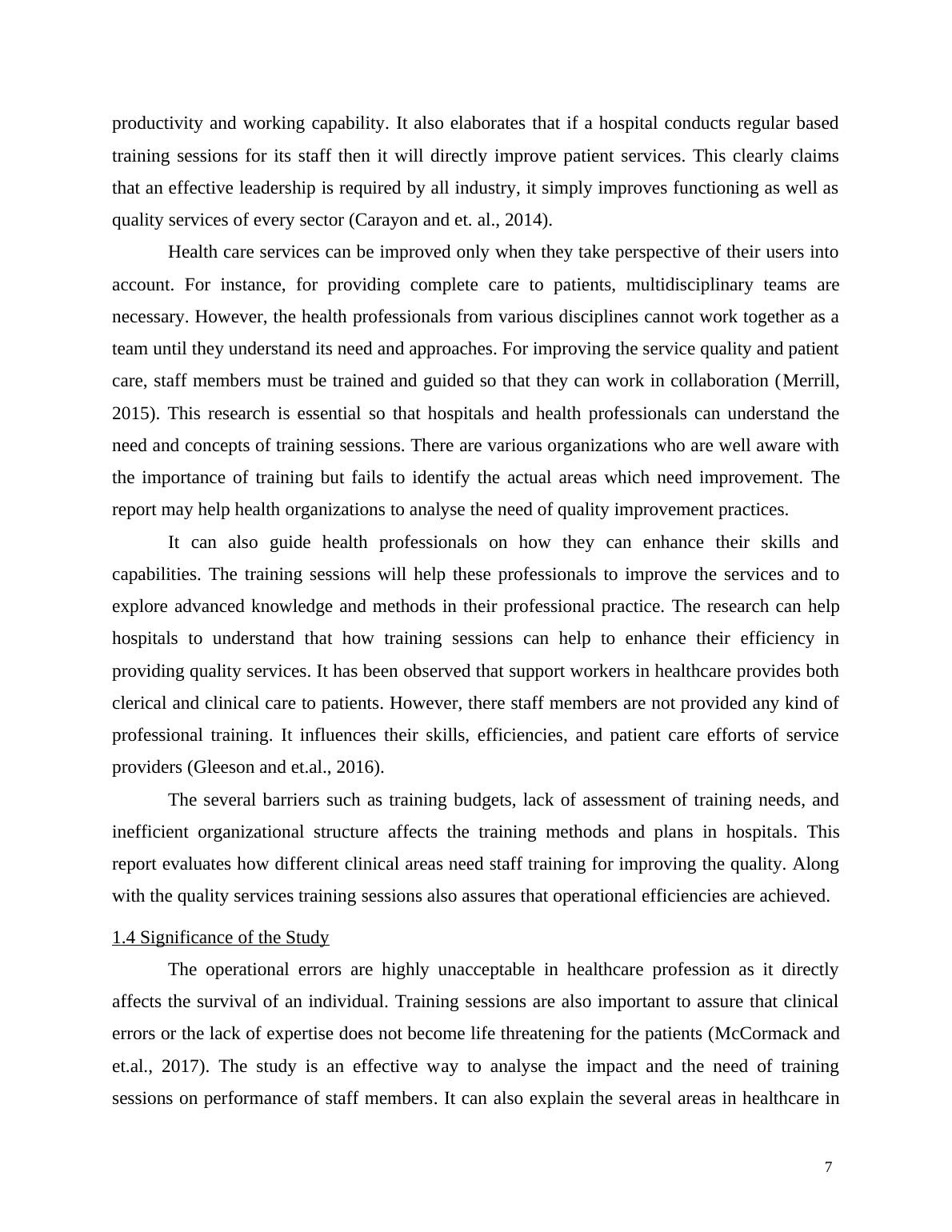
which training sessions are considered as mandatory. It considers a case study of NMC Hospitalso that other health professionals, learners and hospitals can understand the actualimplementation of training needs and practices within healthcare. Research is also important for the learners or students of health services. The interns orlearners can analyse this study to evaluate which skills can be enhanced by training. The researchstudy can guide different staff members to realise that training sessions organised by thehospitals is not only for benefits of organization. Instead, these types of training are focused toimprove the efficiency and skills of staff members (Mohammed and et.al., 2016). The evaluationcan play a critical role in dealing with the several misconceptions related to training. Forexample, many organizations and individuals believes that training is mere waste of money andtime so the report findings may help to evaluate the actual significance and methods of training. 1.5 ScopeThe untrained healthcare service providers are unable to ensure the desired quality ofhealthcare services. However, their performance and accuracy in the delivery of services can beenhanced by the suitable professional training. The analysis may not only be beneficial for thehealth professionals to understand the significance of training but can also be used by the serviceproviding organizations which are facing quality issues. It can also be used in future studieswhich aims at evaluation of performance of health workers. Further the findings can also be usedby the healthcare organizations to improve their functional areas. It will help them to analyse theaspects which needs improvement. For the professionals, it has been always challenging facing the transition from learningto practice phase. The nervousness and lack of experience makes this gap full of inaccuracies orerrors. The regular training sessions can make it possible to eliminate the gap betweenknowledge and implementation. The research outcomes can also be used as the basis forenhancing knowledge of training methods and to demonstrate the significance and necessity ofhealthcare services. 1.6 Research Aims and ObjectivesThe research aim on which entire activities of investigation is based is presented. It alsodescribes objectives which provide guidelines to project-makers to make strategies forachievement of the same (Gleeson and et. al., 2016). For improving effectiveness of services forwell-being of patients in NMC Hospital Group, specific aims and research are given as below: - 8
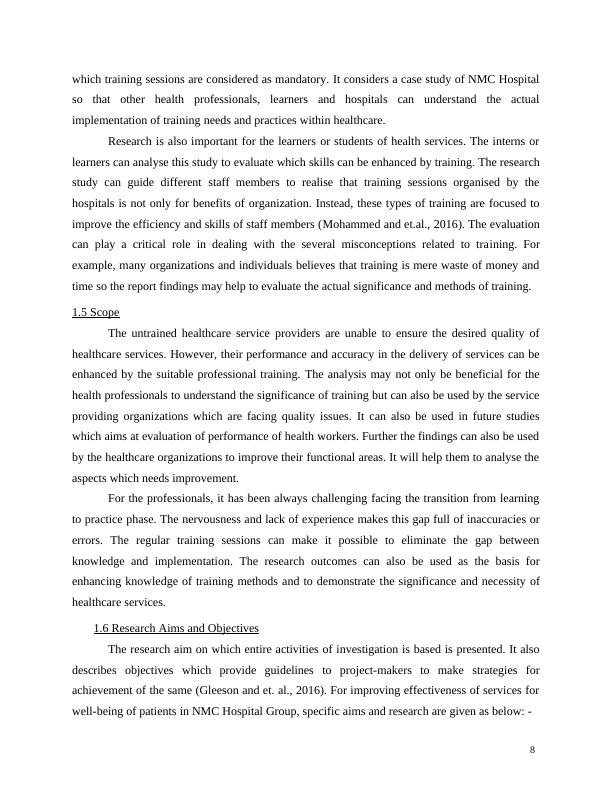
End of preview
Want to access all the pages? Upload your documents or become a member.
Related Documents
Effect of Regular Staff Training on Quality of Patient Serviceslg...
|16
|4652
|487
Impact of Training and Development Programs on Employee Performance (Doc)lg...
|33
|3709
|122
Impact of Assistant Practitioners in Critical Care Unitslg...
|27
|9504
|38
(PDF) Impact of unskilled labour workforce in health care | Assignmentlg...
|35
|4234
|287
Change Management Assignment | Healthcare Assignmentlg...
|35
|11273
|33
Healthcare Assignment: Managing Changeslg...
|40
|14133
|39
